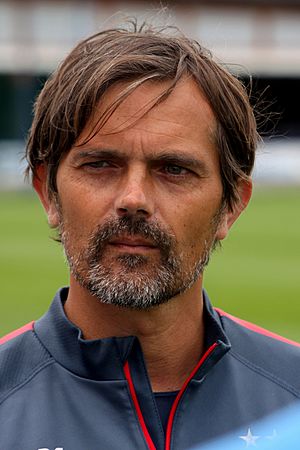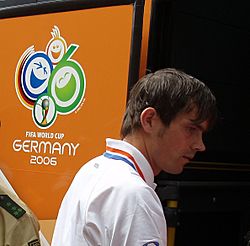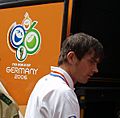Phillip Cocu facts for kids

Cocu in 2014
|
|||||||||||||||||||
| Personal information | |||||||||||||||||||
|---|---|---|---|---|---|---|---|---|---|---|---|---|---|---|---|---|---|---|---|
| Full name | Phillip John-William Cocu | ||||||||||||||||||
| Date of birth | 29 October 1970 | ||||||||||||||||||
| Place of birth | Eindhoven, Netherlands | ||||||||||||||||||
| Height | 1.82 m (6 ft 0 in) | ||||||||||||||||||
| Position(s) | Midfielder | ||||||||||||||||||
| Senior career* | |||||||||||||||||||
| Years | Team | Apps | (Gls) | ||||||||||||||||
| 1988–1990 | AZ Alkmaar | 50 | (8) | ||||||||||||||||
| 1990–1995 | Vitesse | 137 | (25) | ||||||||||||||||
| 1995–1998 | PSV | 95 | (31) | ||||||||||||||||
| 1998–2004 | Barcelona | 205 | (31) | ||||||||||||||||
| 2004–2007 | PSV | 94 | (23) | ||||||||||||||||
| 2007–2008 | Al Jazira | 17 | (4) | ||||||||||||||||
| Total | 598 | (122) | |||||||||||||||||
| International career | |||||||||||||||||||
| 1996–2006 | Netherlands | 101 | (10) | ||||||||||||||||
| Managerial career | |||||||||||||||||||
| 2008–2012 | Netherlands (assistant) | ||||||||||||||||||
| 2012 | PSV (caretaker) | ||||||||||||||||||
| 2013–2018 | PSV | ||||||||||||||||||
| 2018 | Fenerbahçe | ||||||||||||||||||
| 2019–2020 | Derby County | ||||||||||||||||||
| 2022–2023 | Vitesse | ||||||||||||||||||
|
Medal record
|
|||||||||||||||||||
| *Club domestic league appearances and goals | |||||||||||||||||||
Phillip John-William Cocu (born 29 October 1970) is a famous Dutch football manager and former player. He was known as a versatile midfielder who could play in many positions. Cocu was most recently the manager of Vitesse.
He was born in Eindhoven, Netherlands, but grew up in Zevenaar. Phillip started playing football at a young age for local clubs. He began his professional career at AZ in 1988. In 1990, he moved to Vitesse. After five years there, he joined PSV in 1995. With PSV, he won the KNVB Cup and the Eredivisie league title.
From 1998 to 2004, Cocu played for Barcelona in Spain. He became a team captain there and helped them win the La Liga title in 1999. He also played in two UEFA Champions League semi-finals. When he left Barcelona, he held the record for the most league games played by a foreign player for the club.
Cocu returned to PSV in 2004 and won three more Eredivisie titles. He also reached the Champions League semi-finals again. After a year playing for Al Jazira in the United Arab Emirates, he retired from playing football.
Phillip Cocu also played for the Dutch national team from 1996 to 2006. He played in two World Cups and three European Championships. He was known for his strong midfield play. After retiring as a player, Cocu became a successful manager, especially with PSV, where he won three league titles.
Contents
Early Football Days
Phillip Cocu was born in Eindhoven, but his family moved to Zevenaar when he was three years old. He started playing youth football at a local club called DCS when he was six. Even though players usually had to be seven, they made an exception for young Phillip.
He played for DCS for a while before joining De Graafschap's youth academy. After a short time there, he moved to AFC '34 in 1986. Just a year later, his talent was noticed by a professional club. In June 1987, Cocu joined the youth team of AZ.
Playing for Clubs
Starting at AZ and Vitesse
Cocu began his career in the AZ reserve team but quickly moved up to the first team. He played his first professional game on 22 January 1989 for AZ. He was 18 years old and played as a left winger.
He scored his first goal for AZ in a cup match two weeks later. In his first season, he scored four goals. In the 1989-90 season, he played almost every league game. After that season, Cocu was sold to Vitesse for about €272,000.
At Vitesse, Cocu broke his leg in his first season, which meant he only played eight games. But in his second season, he played much more and scored three goals. He scored his first Vitesse goal in August 1991. At Vitesse, Cocu changed from being a left winger to a central midfielder. His coach saw him as a leader in the middle of the field.
In 1992, Cocu played his first European match for Vitesse. They beat Derry City and then Mechelen, with Cocu scoring a long-range goal. Vitesse was eventually knocked out by Real Madrid. In the Dutch league, the team finished fourth. Cocu kept improving, scoring 11 goals in the 1993–94 season. After that season, big clubs like Ajax wanted to buy him, but Vitesse asked for too much money. A year later, PSV and Feyenoord were able to buy him, and he chose to play for PSV.
Success with PSV
Cocu joined PSV in June 1995. He scored in his very first game for PSV against Fortuna Sittard. In his first season, he helped PSV win the KNVB Cup. He scored the first goal in the final match.
In October 1996, Cocu scored twice in a big 7–2 win against Feyenoord. That season, Cocu and PSV won the Johan Cruyff Shield and the Eredivisie league title. In the 1997–98 season, Cocu won the Johan Cruyff Shield again, scoring two goals in the final. PSV finished second in the league that year. After this season, Cocu decided to leave PSV for free. Many big European clubs wanted him, but he chose to join Barcelona, the club he loved as a child.
Playing for Barcelona
At Barcelona, Cocu joined many other Dutch players and their coach, Louis van Gaal. He played in midfield with stars like Luís Figo and Pep Guardiola. Cocu played 36 league games and scored 12 goals, helping Barcelona win the La Liga title in his first season (1998–99).
In his second season, the team finished second in the league. Cocu scored six league goals that year. Barcelona and Cocu reached the UEFA Champions League semi-finals, but they lost to Valencia.
After Van Gaal left in 2000, Barcelona's performance dropped for a couple of seasons. In 2001, Pep Guardiola left, and Cocu became a key part of the new midfield. In the 2001–02 season, Barcelona reached the Champions League semi-finals again, but they were beaten by Real Madrid.
In 2002, Louis van Gaal returned as coach and chose Cocu as the team's vice-captain. The 2002–03 season was tough for Barcelona, and Cocu tore a knee ligament in a Champions League match, which kept him out for two months. His contract was ending in 2003, but he decided to stay for one more year after the club's presidential elections.
The 2003–04 season started with a new coach, Frank Rijkaard. Cocu scored Barcelona's first league goal of the season. He played 36 league games and often served as the team captain. Barcelona finished second in La Liga. In early 2004, Barcelona decided not to renew Cocu's contract because they couldn't agree on a new deal. Cocu was sad to leave but happy to return to PSV. When he left, he was given an award for his loyalty. Cocu's 205 La Liga games and 291 total appearances were records for a foreign player at Barcelona until Lionel Messi broke them years later.
Back to PSV and Al-Jazira
In 2004, Cocu signed a two-year contract to return to PSV. He played in midfield with Johann Vogel and captain Mark van Bommel. In the 2004–05 season, PSV won the Eredivisie and the KNVB Cup. They also reached the UEFA Champions League semi-finals. In the Champions League, Cocu scored an important goal against Lyon. In the semi-finals against Milan, PSV almost made a comeback, with Cocu scoring a goal, but they were still eliminated.
When Mark van Bommel left PSV in 2005, Cocu became the new captain. PSV won the league title again in the 2005–06 season. Cocu was recognized as the second-best Eredivisie player that year. After the season, he signed a one-year contract extension.
The 2006–07 season was exciting. PSV started well, but their performance dropped later. The championship was decided on the very last day. PSV played Vitesse and won 5–1, with Cocu scoring the final goal. This goal was super important because it meant PSV won the title by just one goal difference over Ajax!
Cocu thought about retiring after the 2006–07 season. But he received offers from Australia and Al Jazira Club. He chose to sign a one-year deal with Al Jazira in the United Arab Emirates in August 2007. He scored in his very first game for them. After the season, he decided to return to the Netherlands to start his coaching career. In July 2009, PSV held a special farewell match for Cocu at their stadium, with many famous former players joining in.
Playing for the Netherlands
Phillip Cocu almost played for the Dutch national team in 1994, but he didn't make the final squad for the 1994 World Cup. His international debut came in early 1996, when he was 25, in a friendly match against Germany. He scored his first international goal against the Republic of Ireland in June.
Cocu played in Euro 1996 and became a regular starter. Two years later, he played in the 1998 World Cup. He scored two goals in the group stage. In the semi-final against Brazil, the game went to a penalty shootout. Cocu missed his penalty, and the Netherlands lost, missing out on the final.
Cocu and the Netherlands also played in Euro 2000, which they co-hosted. They won all their group matches and the quarter-final. But again, they lost in the semi-finals after a penalty shootout, this time against Italy. The Netherlands then failed to qualify for the 2002 World Cup.
In 2003, Cocu received his first red card in a friendly match. The Netherlands did well in the Euro 2004 qualifiers, with Cocu scoring twice. During Euro 2004, Cocu was the team captain and played in all matches. In the quarter-finals, he missed a penalty in the shootout against Sweden, but the Netherlands still won. They were eliminated by Portugal in the semi-finals. After Euro 2004, Cocu lost the captain's role.
The Netherlands qualified for the 2006 World Cup, with Cocu scoring three goals in the qualifiers. He was a key player in most games. At the World Cup, the Netherlands made it out of their group but were knocked out by Portugal in a very tough match. After the tournament, Cocu retired from international football. He played 101 games for the Netherlands, which makes him one of the players with the most appearances for his country. He was given a special farewell before a match in September 2006.
How He Played
Phillip Cocu was a very complete and flexible player. He could play as a defender, a midfielder, and even a forward. He once said that the only positions he never played were right full-back and goalkeeper! He was known for his smart play and ability to control the game from midfield.
Becoming a Manager
Coaching PSV Eindhoven
After retiring from playing in 2008, Cocu wanted to become a football coach. He started taking courses and returned to PSV to help with their youth teams. He also became an assistant coach for the Dutch national team under Bert van Marwijk.
Later, he became a trainee coach for the PSV first team. In January 2009, he became the assistant manager. In February 2010, he passed his coaching exam, which meant he could manage a team in the Netherlands. He also continued as an assistant for the Dutch national team and was part of the team that reached the 2010 World Cup final, where they lost to Spain.
In December 2010, Cocu was promoted to first assistant manager for the Dutch national team. In the summer of 2011, he signed a new contract with PSV. When the PSV manager was fired in March 2012, Cocu was appointed as the temporary manager for the rest of the season. During this time, he brought young player Memphis Depay into the first team. Even though results didn't immediately improve, his team won the KNVB Cup by beating Heracles Almelo 3–0 in the final.
For the 2012–13 season, PSV hired a new manager, but it was decided that Cocu would take over if that manager left. When the manager quit after the season, Cocu signed a four-year contract to become the official manager of PSV. He focused on developing young players from PSV's own youth academy. On 18 April 2015, Cocu led PSV to win the Eredivisie title after a 4–1 win over Heerenveen. This was PSV's first league title since 2008, ending Ajax's four-year winning streak. Cocu's team successfully defended the league title the next season. He won three league titles in his five years as PSV manager.
Coaching Other Clubs
On 22 June 2018, Cocu became the manager of Fenerbahçe in Turkey. He signed a three-year deal. However, he was dismissed on 28 October 2018, as the club was struggling near the bottom of the league table.
On 5 July 2019, Cocu was announced as the new manager of Derby County in England. He guided Derby to a 10th-place finish in the Championship league. He left Derby County on 14 November 2020, when the club was at the bottom of the league.
Cocu returned to coaching on 26 September 2022, taking over at Vitesse, the club he played for until 1995. He resigned on 11 November 2023 after a home loss that left the team at the bottom of the league table.
Career Achievements
As a Player
- PSV
- Eredivisie (Dutch League Title): 1996–97, 2004–05, 2005–06, 2006–07
- KNVB Cup (Dutch Cup): 1995–96, 2004–05
- Johan Cruyff Shield (Dutch Super Cup): 1996, 1997
- Barcelona
- La Liga (Spanish League Title): 1998–99
- Al Jazira
- Gulf Club Champions Cup: 2007
As a Manager
- PSV
- Eredivisie (Dutch League Title): 2014–15, 2015–16, 2017–18
- KNVB Cup (Dutch Cup): 2011–12
- Johan Cruyff Shield (Dutch Super Cup): 2015, 2016
- Individual Awards
- Rinus Michels Award (Best Dutch Manager): 2015, 2018
Images for kids
See also
 In Spanish: Phillip Cocu para niños
In Spanish: Phillip Cocu para niños




